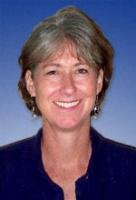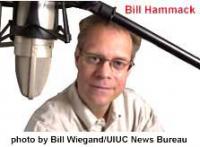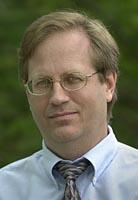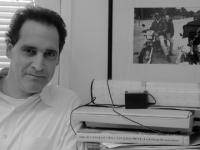2002 Science in Society Journalism Award winners
Presented February 15, 2003, at the NASW reception in Denver
Ramifications of Research on Society Are Focus of Science in Society Awards
By Carol Ezzell and Peggy Grishman
The frontiers of human reproduction, the search for an AIDS vaccine, evolution, the challenge of obesity, engineering feats, the perils of e-junk, and a personal search for one reporter’s genetic roots are the subjects of this year’s best reporting on how science impacts society, as reflected in the 2002 Science in Society awards of the National Association of Science Writers (NASW).
NASW holds the independent competition annually to honor outstanding investigative and interpretive reporting about the sciences and their impact on society for good or ill. The 67-year-old organization aims to recognize and encourage critical, probing works in six categories — newspaper, magazine, television, radio, Web, and book — without subsidy from any professional or commercial interest. The award is unique in that entries must not only be well-written or produced accounts of significant scientific issues, they must also explore the ramifications of research results to society. Winners each receive $1,000 and a certificate, which will be awarded in February at the 2003 annual meeting of NASW in Denver.
In the newspaper category, Rick Weiss of the Washington Post took top honors for "Building a New Child: Embryo Screening Creates a Tool Against Disease-and Ethical Questions" (June 30, 2001), in which he brought a combination of excellent enterprise reporting, fine writing, and great ideas to his story and his coverage of this issue. At a time when so many reporters are writing either explanatory "gee-whiz" or political stories about hi-tech, baby-making procedures, Weiss stood out in his ongoing critical examination of the important and unresolvable ethical dilemmas created by these techniques.
In a category brimming with outstanding entries this year, two people shared the magazine award: Shannon Brownlee, Senior Markle Fellow of the New America Foundation, for "The Big Fat Question," published in Self magazine (December 2001), and Charles W. Schmidt, Environmental Health Perspectives, for "e-Junk Explosion" (March 2002). In citing Brownlee’s work, the judges applauded an article about fat that truly stood out in a magazine that has probably had more than its fill of stories about fat. The panel felt Brownlee’s intelligent and elegant prose brought out important scientific ideas that may not normally reach the magazine’s readership. Co-winner Schmidt’s story showcased great reporting on a subject that the panel felt has been vastly undercovered. This entry highlighted a social problem, created by new technology — and one that has technological and social solutions.
If there had been a Science in Society prize in Darwin’s days, evolution would have been a real contender, and it obviously still is. In the television category, Richard Hutton, executive producer, WGBH/NOVA Science Unit, is honored for "Evolution" (broadcast Sept. 24-27, 2001). Credit goes to the producers of this landmark series for recognizing the impact the science of evolution has had on society for well over 100 years. This captivating series took viewers from jungles to islands to classrooms to highlight the continuing scientific discoveries and political struggles over one of the most basic topics in all of science.
William S. Hammack, associate professor for chemical engineering, University of Illinois, and Illinois Public Radio, won in the radio category for "Engineering and Life," WILL-AM580, Urbana, Ill. (June 5, 2001-May 31, 2002). The judges simply fell in love with William Hammack. His clever commentaries about extraordinary and ordinary things and how they came to be opens a window on engineering, science, discovery, and their role in our world. Prof. Hammack is a true storyteller, drawing in the listener with his fine writing.
Web judging is challenging: there’s the writing, the graphics, the video, the audio, the links, the photos — the whole package can take hours to view and appreciate. The judges felt that Alan Boyle, of MSNBC, exploited all the Web can offer — in the best possible way — with "Genetic Genealogy" (Jan. 16-Feb. 26, 2002). His judicious use of personal journalism helped bring the often-complex subject of genes alive. He varied the writing and the styles of the articles (or whatever you call things displayed on the Web!) and keeps drawing the Web visitor deeper and deeper into the material, creating even more curiosity.
Jon Cohen, contributing editor, Science, took top honors in the book category for Shots in the Dark: The Wayward Search for an AIDS Vaccine (W.W. Norton & Company, 2001). Engaging, well researched, and well written, the book skillfully shows the tug-of-war between science and society in the search for an AIDS vaccine. It’s an important book, not simply because AIDS is such an important research topic, but because society needs to learn from the mistakes and successes of what has, so far, been an unsuccessful search for a vaccine. Cohen shows that this saga has impact on whether science is going to remain relevant in the future when big problems arise.
The awards are administered by Diane McGurgan, executive director of NASW. The deadline for submitting entries for the 2003 Science in Society awards is July 1, 2003, for work published or broadcast in North America between June 1, 2002, and May 31, 2003. Books must have a 2002 copyright date and be published during that calendar year.
Book
Jon Cohen
Shots in the Dark: The Wayward Search for an AIDS Vaccine
Jon Cohen, contributing editor, Science, took top honors in the book category for Shots in the Dark: The Wayward Search for an AIDS Vaccine (W.W. Norton & Company, 2001). Engaging, well researched, and well written, the book skillfully shows the tug-of-war between science and society in the search for an AIDS vaccine. It’s an important book, not simply because AIDS is such an important research topic, but because society needs to learn from the mistakes and successes of what has, so far, been an unsuccessful search for a vaccine. Cohen shows that this saga has impact on whether science is going to remain relevant in the future when big problems arise.
Jon Cohen has covered infectious diseases for 15 years, traveling extensively through the United States, Europe, Africa, Mexico and Thailand.
Cohen began writing for Science in 1990, becoming one of the world’s leading HIV/AIDS reporters. In addition to reporting on a wide range of scientific and medical topics for Science, Cohen has done in-depth, investigative stories about the National Institutes of Health, biodefense, tobacco industry funding of science, the troubled vaccine industry, credit battles, the genomics revolution, and the science press itself.
He also has written for the New Yorker, Atlantic Monthly, Talk, Discover, the New York Times, the Washington Post, Smithsonian, Slate, the New Republic, Surfer, and other publications. Cohen in 1998 received a Sloan Foundation grant to complete Shots in the Dark: The Wayward Search for an AIDS Vaccine, which was published by W.W. Norton in January 2001.
His 1997 Science article about the rise and fall of an AIDS research program in the former Zaire won the international health reporting award from the Pan American Health Organization. From 1986-1990 he was senior editor at the City Paper in Washington, D.C.
Cohen earned a B.A. in 1981 from the University of California, San Diego, where he majored in science writing. Cohen lives in Cardiff-by-the-Sea, California, with his wife, a TV documentary producer, and their three children.
Magazine
Shannon Brownlee
Self magazine
In citing Brownlee’s work, the judges applauded an article about fat that truly stood out in a magazine that has probably had more than its fill of stories about fat. The panel felt Brownlee’s intelligent and elegant prose brought out important scientific ideas that may not normally reach the magazine’s readership.
Shannon Brownlee has previously served as a staff writer at Discover magazine and as a senior writer at U.S. News & World Report. Her articles and essays on genetics, cancer research, and health care policy have also appeared in such publications as Time magazine, the New York Times, the Washington Post, the New Republic, and the Wilson Quarterly.
Brownlee was an invited speaker in 1991 at a symposium for Nobel Laureates in Stockholm, Sweden. Her work was featured in The New Science Journalists, a book published in 1995, and she was a recipient of the 1998 Sigma Delta Chi Award from the Society of Professional Journalists.
Charles W. Schmidt
Environmental Health Perspectives
Schmidt’s story showcased great reporting on a subject that the panel felt has been vastly undercovered. This entry highlighted a social problem, created by new technology — and one that has technological and social solutions.
Charles W. Schmidt is a freelance science writer specializing in the environment, genomics, and information technology, among other topics. His work has appeared in numerous national and international publications including Technology Review, Child Magazine, and New Scientist.
Charlie holds a Masters Degree in Public Health from the University of Massachusetts at Amherst. He worked as a toxicologist with a major environmental consulting firm where he specialized in risk assessment before launching his current career. As a professional writer, his credits include magazine articles, news stories, technical reports, and conference coverage.
Newspaper
Rick Weiss
“Building a New Child: Embryo Screening Creates a Tool Against Disease — and Ethical Questions”
In the newspaper category, Rick Weiss of the The Washington Post took top honors for “Building a New Child: Embryo Screening Creates a Tool Against Disease-and Ethical Questions” (June 30, 2001), in which he brought a combination of excellent enterprise reporting, fine writing, and great ideas to his story and his coverage of this issue.
At a time when so many reporters are writing either explanatory “gee-whiz” or political stories about hi-tech, baby-making procedures, Weiss stood out in his ongoing critical examination of the important and unresolvable ethical dilemmas created by these techniques. Rick Weiss is a science and medical reporter for the The Washington Post. He came to the Post’s Health section in 1993 and moved to the national desk in January 1996, where he covers genetics, molecular biology and other topics in the life sciences.
Before coming to the Post, Weiss was a staff writer for Health magazine in San Francisco. Before that he was for four years a biology and biomedicine writer at Science News magazine, a Washington, D.C.-based weekly. He also spent a year as a science writer for Memorial Sloan-Kettering Cancer Center.
Weiss earned a B.S. in biology from Cornell University in 1974. For ten years he worked as a licensed medical technologist in hospital laboratories, specializing in microbiology, serology and blood banking. In 1983 he entered the Graduate School of Journalism at the University of California, Berkeley, where he earned a Masters in Journalism in 1985. He has written articles for the New York Times, the Los Angeles Times, <a href="http://www.sciencemag.org/" target=_new">Science, Discover and other publications.
Weiss lives in Takoma Park, Md., with his wife, New York Times science writer Natalie Angier, and their daughter, Katherine.
Radio
William S. Hammack
WILL-AM580 and Illinois Public Radio
William S. Hammack, associate professor for chemical engineering, University of Illinois, and Illinois Public Radio, won in the radio category for “Engineering and Life,” WILL-AM580, Urbana, Ill. (June 5, 2001-May 31, 2002). The judges simply fell in love with William Hammack. His clever commentaries about extraordinary and ordinary things and how they came to be opens a window on engineering, science, discovery, and their role in our world. Prof. Hammack is a true storyteller, drawing in the listener with his fine writing.
Bill Hammack has written and broadcast over 175 public radio commentaries on engineering and technology. Rather than focusing simply on how things work, Bill explores the role and ramifications of science and technology within the broader society. His work was best described recently by Science magazine: “Bill Hammack can rhapsodize over the clever design of a soda can or a Scotch tape dispense. Every week he explores the genesis of ordinary things such as superglue, contact lenses, the Internet, matches, and even SPAM, the canned meat. His light, often humorous essays also provide insight into the cultural forces that speed or hamper the acceptance of new products and the inventors’ often unexpected sources of inspiration.” [Science May 17, 2002 p. 1207]
Among the awards and honors he’s received for his radio work are the Edwin F. Church Medal from the American Society of Mechanical Engineers, the Service to Society Award from the American Institute of Chemical Engineers, and the Silver Reel for National News & Commentary from the National Federation of Community Broadcasters.
Bill teaches chemical engineering at the University of Illinois at Urbana-Champaign. He earned a B.S. in chemical engineering at Michigan Technological University; and his M.S. and Ph.D at the University of Illinois. Immediately after graduation he taught engineering in Pittsburgh at Carnegie Mellon,University of Illinois.
At Illinois he has focused on teaching the public about engineering. In addition to his radio work Bill teaches a novel General Education course on engineering for students of all majors — including history, business, and dance!
He lives in Urbana, Illinois with his wife, Amy.
Television
Richard Hutton
If there had been a Science in Society prize in Darwin’s days, evolution would have been a real contender, and it obviously still is. In the television category, Richard Hutton, executive producer, WGBH/NOVA Science Unit, is honored for “Evolution” (broadcast Sept. 24-27, 2001). Credit goes to the producers of this landmark series for recognizing the impact the science of evolution has had on society for well over 100 years. This captivating series took viewers from jungles to islands to classrooms to highlight the continuing scientific discoveries and political struggles over one of the most basic topics in all of science.
Richard Hutton is the Vice President of Media Development for Vulcan Productions, overseeing the operations of its movie and documentary units. Among Vulcan’s productions are the feature film “Far From Heaven” and “The Blues,” a seven-part documentary series airing on PBS in Fall 2003. Hutton also serves on the board of TechTV.
Hutton was the executive producer of the critically acclaimed PBS series “Evolution” co-produced by the WGBH/NOVA Science Unit and Vulcan Productions.
Before “Evolution” Hutton was senior vice president of creative development at Walt Disney Imagineering. There, he oversaw the creative team responsible for the design of all Disney three-dimensional storytelling (theme parks, retail concepts, etc.). He came to Imagineering from the Disney Institute where, as vice president and general manager, he directed the transition of the organization from an idea into an operating business.
Before Disney, Hutton was senior vice president, television programming and production, for WETA Television in Washington, D.C., and earlier, director of public affairs programming for WNET Television in New York. His projects have included the award-winning “The Brain” (1984) and “The Mind” (1988), as well as nine books and various medical texts and articles for national publications, including the New York Times Magazine, Omni and Cosmopolitan.
Web
Alan Boyle
Boyle’s judicious use of personal journalism helped bring the often-complex subject of genes alive. He varied the writing and the styles of the articles (or whatever you call things displayed on the Web!) and keeps drawing the Web visitor deeper and deeper into the material, creating even more curiosity.
In his role as MSNBC.com’s science editor, Alan Boyle deals with stories ranging from the origins of the universe to the future of the human genome, as well as black holes, quantum dots, lost cities, space shots, extreme treks, nanobots — in short, a virtual curiosity shop of space exploration, the physical sciences, anthropology, paleontology, archaeology and other -ologies that strike his fancy.
During a quarter-century of daily journalism, including stints at The Cincinnati Post, The (Spokane) Spokesman-Review and the Seattle Post-Intelligencer, he’s survived a hurricane, a volcanic eruption and an earthquake. He has faith he’ll survive the Internet as well.
2002 Science in Society Journalism Awards committee
AWARD CHAIRS
- Carol Ezzell, staff editor and writer, Scientific American
- Peggy Girshman, assistant managing editor, National Public Radio
BOOK AWARD COMMITTEE
- Steve Tally, author, Purdue University (chair)
- Sara Latta, author
- Ivan Amato, author
- Sally Maran, managing editor, Smithsonian
MAGAZINE AWARD COMMITTEE
- Carol Ezzell, staff editor and writer, Scientific American (chair)
- Marquerite Holloway, science writing instructor, Columbia School of Journalism
- Nancy Shute, U.S. News & World Report
NEWSPAPER AWARD COMMITTEE
- Pete Spotts, Christian Science Monitor (chair)
- Lee Hotz, Los Angeles Times
- Eric Sorenson, The Seattle Times
- Lori Valigra, freelance
BROADCAST AWARD COMMITTEE
- Don Torrance, Syracuse University (chair)
- Nancy Sharp, Syracuse University
- Jane Weiner, documentary filmmaker
WEB AWARD COMMITTEE
- Jim Keeley, Howard Hughes Medical Institute (chair)
- Anne Amparo, ScienCentral
- Dave Tennenbaum, The Why Files
FINAL SELECTION COMMITTEE
- Dan Haney, medical editor, Associated Press
- John Rennie, editor-in-chief, Scientific American
- Jane Stevens, multi-media freelance journalist
- Laura Tangley, National Wildlife magazine







